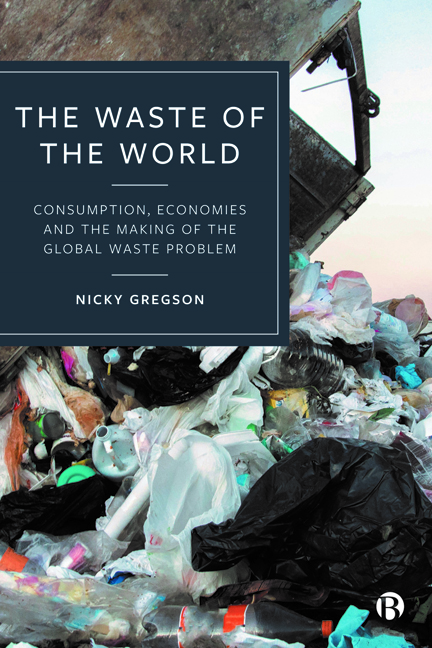Book contents
- Frontmatter
- Contents
- Acknowledgements
- Preface
- 1 The Global Waste Problem and How to Think about It: Or, how to understand the ‘too much waste’ problem
- 2 Discard, Social Order and Social Life: Or, discard is foundational to understanding waste
- 3 Consumption, Consumer Practices and Consumer Discard: Or, how consumer discard relates to economies
- 4 Conduits, Value Regimes and Valuation: Or, following consumers’ discarded things
- 5 Recommodifying Discard: Or, the challenges of turning discard into an economic good
- 6 Waste, Money and Finance: Or, how turning discard into waste turns waste into an energy resource and an asset
- 7 Future Directions: Or, rewiring waste through the three Ds (decarbonization, digital and discard)
- Notes
- References
- Index
6 - Waste, Money and Finance: Or, how turning discard into waste turns waste into an energy resource and an asset
Published online by Cambridge University Press: 18 January 2024
- Frontmatter
- Contents
- Acknowledgements
- Preface
- 1 The Global Waste Problem and How to Think about It: Or, how to understand the ‘too much waste’ problem
- 2 Discard, Social Order and Social Life: Or, discard is foundational to understanding waste
- 3 Consumption, Consumer Practices and Consumer Discard: Or, how consumer discard relates to economies
- 4 Conduits, Value Regimes and Valuation: Or, following consumers’ discarded things
- 5 Recommodifying Discard: Or, the challenges of turning discard into an economic good
- 6 Waste, Money and Finance: Or, how turning discard into waste turns waste into an energy resource and an asset
- 7 Future Directions: Or, rewiring waste through the three Ds (decarbonization, digital and discard)
- Notes
- References
- Index
Summary
In this chapter, I examine what happens when discard becomes waste. My argument here is that while there is no inevitability that discard will become waste, there are strong pressures that it does. More than this, I argue that there are drivers that work to ensure that the proportion of discard that is captured as waste actually increases. Rather than this being a period characterized by waste reduction, the world is currently in a situation that demands the converse: that more waste is generated.
To make this argument is to go against an industry and regulatory narrative that presents the current situation as one in which business and regulators are increasingly aligned in their pursuit of Zero Waste. That, I maintain, is ‘greenwash’, for – leaving aside the impossibility of that goal – what the Zero Waste narrative does is to mask that the waste management business (or, as it increasingly casts itself, the waste-to-resource business) is very much a waste business. In other words, it makes (very large amounts of) money by attending to materials classified as waste. So, at a fundamental level there is every incentive for the waste business to want more waste. But just what kind of ‘more waste’ does it want?
Of critical importance here is the category of waste that the industry labels as ‘residual’ – or that which is not suitable for recovery for recycling, or reuse. Taking the materials that can be recovered for recycling, sorting and separating them, and then selling them into the commodity markets is one means by which the waste industry makes money from the waste stream. That was the focus of Chapter 5. But the other – and much bigger – source of revenue, at least according to company accounts, comes from the management of the residual waste stream. To understand why residual waste generates the most revenue for waste businesses, we need to understand the technologies that are used to attend to it, but not just as technologies, which is how the waste business presents the management of waste to outsiders. Here, emphasis is placed on the technical processes that enable the safe treatment of material declared to be waste.
- Type
- Chapter
- Information
- The Waste of the WorldConsumption, Economies and the Making of the Global Waste Problem, pp. 133 - 163Publisher: Bristol University PressPrint publication year: 2023



